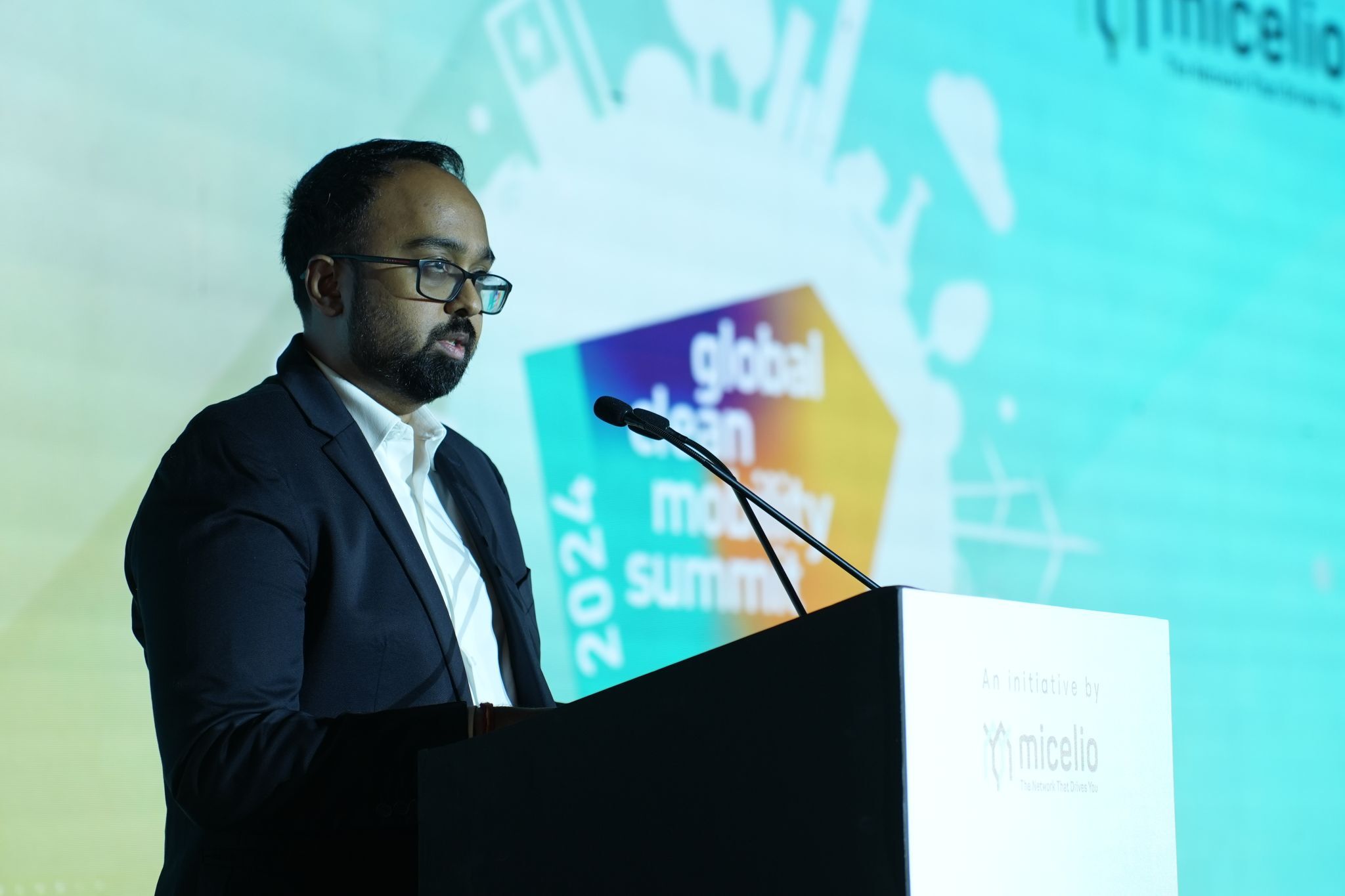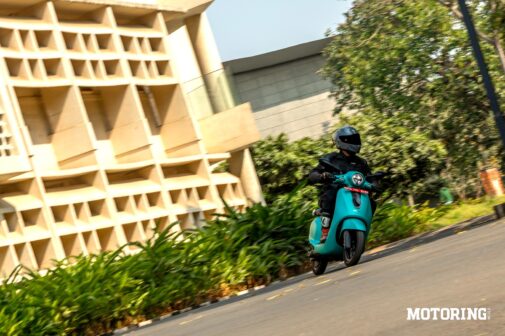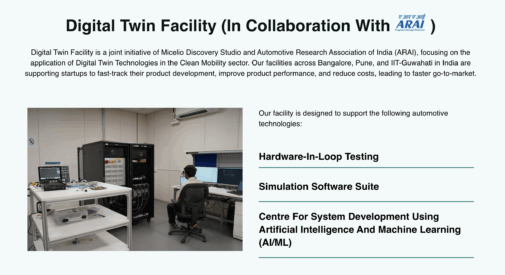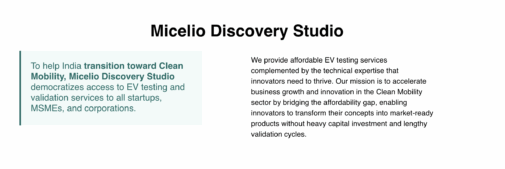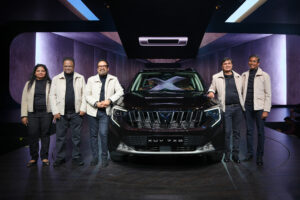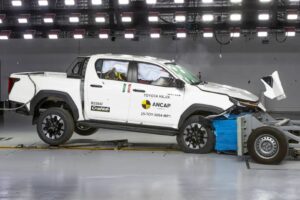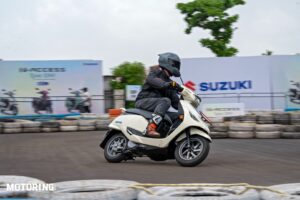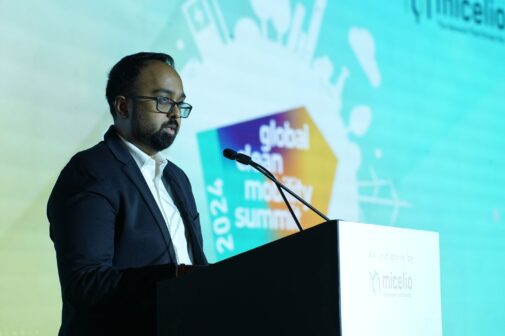
Motoring World (MW): What is the long-term vision for the Micelio Discovery Studio’s role in shaping India’s EV ecosystem?
Shreyas Shibulal (SS): The intent behind Micelio Discovery Studio is to make rigorous testing an integral and accepted norm within the Indian EV ecosystem. Indian innovators have the capability not only to meet domestic demand but to build world-class products for global markets. We want to empower them to develop robust, reliable, and scalable EV solutions that can compete on a global stage.
To achieve this, it is essential that testing and validation become a non-negotiable part of the innovation process. Testing is not a luxury; it has to be the norm.
Micelio Discovery Studio enables and democratises the process by providing the technology infrastructure support for comprehensive testing and validation.
MW: Based on your testing data, what is the single biggest technical bottleneck for Indian EV innovators today?
SS: One of the most significant technical challenges facing Indian EV innovators today is accurately replicating real-world driving conditions within a controlled test bench environment. For context, on Indian roads, Electric vehicles can experience sudden voltage spikes when subjected to shocks such as hitting potholes or abrupt braking.
The process of replicating this in a controlled environment is heavily dependent on receiving precise, high-quality input data from customers. When the data is well structured and filtered, we are able to effectively translate those real-world parameters into our testing systems, allowing us to validate the Device Under Test (DUT) with a high degree of accuracy.
MW: Does the ARAI partnership signal a broader strategy to bridge private innovation and public standards?
SS: Yes, Micelio’s partnership with Automotive Research Association of India (ARAI) reflects a broader strategic intent to bridge private innovation with public standards. The core reason Micelio and ARAI came together was to democratise access to advanced technologies for all innovators, regardless of their scale through the Digital Twin Lab.
We recognise that larger industry players often have the advantage of being able to invest in high-end infrastructure and sophisticated tools, allowing them to move faster and build better. Our aim is to level that playing field by making the same capabilities accessible to emerging entrepreneurs and startups.
MW: What is the one critical skill gap you are addressing with your Industry-Ready Program?
SS: Micelio’s Industry-Ready Program for Clean Mobility addresses the lack of core engineering knowledge tailored to clean mobility. Developing electric vehicles requires a fundamentally different approach compared to working on internal combustion engine systems. Clean mobility is deeply rooted in hardware, and demands a solid understanding of electric powertrains, battery technologies, and related components.
At Micelio, we are supporting OEMs navigate the shift from conventional vehicles to electric ones by offering practical insights into the EV ecosystem. Through our Micelio Discovery Studio, participants gain hands-on experience that strengthens both technical capability and system-level understanding.
We also see the Discovery Studio as a valuable resource for academic institutions. It provides a space for students to apply their learnings in a real-world setting. This facility is a significant investment from Micelio, and we invite educational institutions to make full use of it to better prepare their students for the evolving mobility industry.
MW: How do you assess Indian EV tech’s global competitiveness, and what’s needed for leadership?
SS: India has several inherent strengths that position it well in the global EV ecosystem. We have a young, entrepreneurial population, a strong innovation mindset, and the ability to spot opportunities in emerging sectors. These qualities are essential for building not just for India, but for the world.
However, to truly lead on the global stage, India must not focus solely on assembling products, but rather aim to become a hub for deep R&D. This will provide a long-term edge in the global tech game, creating high-value jobs and positioning us as leaders in clean mobility innovation. Achieving this requires a robust foundation, greater investment in research, access to patient capital, faster policy evolution, and stronger global integration.
MW: What is the ultimate synergy you see between your fund, studio, and community platforms?
SS: Each of our verticals identifies and solves a key challenge to enable a thriving clean mobility ecosystem. The Fund provides patient capital to help innovators realize their vision. The Micelio Discovery Studio goes beyond funding because capital alone is not enough, startups also need access to technology, which the Studio provides for experimentation and scaling. Micelio Pulse drives awareness and adoption of clean mobility through research and collaborations with think tanks and academic institutions. Our Community connects startups, manufacturers, investors, and others sparking the right conversations with the right people. Together, these platforms bring ideas, technology, knowledge, and networks together to accelerate sustainable mobility.
MW: What’s the biggest surprise or lesson learned from operating the Studio since 2021?
SS:One of the most important lessons we have learned since launching the Studio in 2021 is that testing is not yet a widely adopted practice across the ecosystem. This was a learning for us, especially considering how essential testing is to build reliable and scalable solutions in clean mobility.
We found that while there is a strong focus on innovation and speed, the role of systematic testing often requires more emphasis. This highlighted the need for greater awareness around testing, particularly in the early stages of product development. At Micelio, we have made it a priority to drive this awareness and support startups in building more robust and future-ready solutions.
MW: How do you prioritise which EV technologies or components to focus on for future testing capabilities?
SS: At Micelio, we prioritise testing capabilities by staying closely connected with the EV ecosystem. Our team regularly engages with innovators across all stages to understand emerging technologies and real market needs. This direct feedback helps us identify gaps and focus on areas that will have the greatest impact on the industry’s future.
MW: What does success look like for Micelio in the next 3 years? A specific metric or milestone.
SS: Over the next three years, we have set several milestones for Micelio Discovery Studio. A key marker of success will be seeing any clean mobility product launched in India tested at our lab. This would show that we have contributed to spreading awareness about the importance of testing. We also want to work closely with every global OEM launching in India. We aim to become their trusted testing partner. Our goal is to provide reliable and high-quality testing services that OEMs can depend on. We also plan to expand into areas like BESS testing. This will allow us to support the clean mobility ecosystem more broadly.
MW: For a startup with a great prototype, what’s the one piece of advice you always give?
SS: Look beyond the obvious. That’s the one key piece of advice I always give to startups who have developed a strong prototype. For example, a common misconception about electric vehicle (EV) testing is that it is solely about batteries and range. In truth, EV testing is far more comprehensive. It encompasses software performance, thermal management, charging infrastructure compatibility, safety validation, and even acoustic profiling.
This holistic approach is critical. A prototype might demonstrate technical promise, but to scale successfully, it must perform reliably across all dimensions. Startups often focus on refining what is visible or easily measured, but long-term success comes from identifying and addressing potential weak links early.
By embracing a broader view of validation and comprehensive testing, startups position themselves to deliver products that are not only innovative but also market-ready and resilient.
MW: Is the ultimate goal for the Studio to become a self-sustaining business, or will it remain a strategic, ecosystem-focused initiative?
SS: Micelio has been a for-profit organisation from day one. While strengthening and supporting the broader clean mobility ecosystem remains its core focus, it operates with a clear mandate of financial self-sustainability. We believe that being self-sustaining is essential not only to ensure long-term impact but also to continue providing meaningful, consistent support to the ecosystem. This approach allows us to stay mission-aligned while building resilience and accountability in everything we do.
MW: How is the ‘Global Clean Mobility Summit’ different than any other event in the ecosystem?
SS: The Global Clean Mobility Summit stands apart from other events in the ecosystem because it is built with a singular focus on clean mobility. At Micelio, our mission has always been to accelerate the transition to sustainable transportation, and this summit reflects that commitment. Every participant at this summit, whether a startup, corporate leader, policymaker, or investor is curated with this specific vision.
This creates a uniquely high-quality environment where conversations are not only relevant but also actionable. The depth of engagement, the alignment of interests, and the potential for meaningful collaboration are significantly stronger because everyone is working towards the same goal.
MW: Why did you constitute the ‘Micelio Mobility Awards’?
SS: The Micelio Mobility Awards were instituted to recognise and celebrate excellence across the entire clean mobility ecosystem. Clean mobility is a sunrise sector, and we believe it is essential to acknowledge the diverse efforts driving this critical transition in India. Through these awards, our aim is not only to recognise achievement but to also inspire continued innovation and collaboration in the sector. That is why we have designed award categories that span a wide spectrum, from Student Startup of the Year to Ecosystem Enabler of the Year.
The most prestigious among these is the Individual Contributor of the Year Award. This category has been specially created to honour those individuals who have consistently demonstrated leadership, vision, and impact in advancing India’s clean mobility journey.
These are the people who are at the forefront of the movement, and their work is instrumental in shaping a sustainable future.





